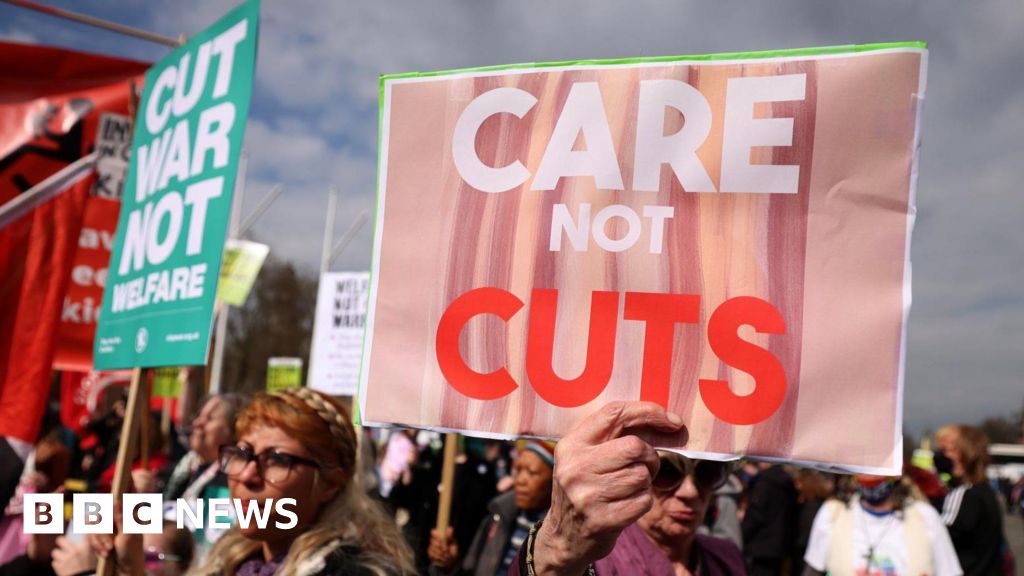Money editor, BBC Wales News
 EPA
EPAThe incomes of people in Wales could be cut by £466m by 2029-30 as part of the UK government’s disability welfare reforms, according to new analysis.
Data analytics company Policy in Practice told Walescast that almost 190,000 people are likely to be affected – 6% of the population.
Brian Evans from Swansea, who receives support for multiple health problems, said the uncertainty meant he was constantly anxious with “the worry of what’s going to happen to me”.
The Department for Work and Pensions said it would not compromise on protecting people “who need our support”, and that reforms “will mean the social security system will always be there for those who will never be able to work”.

Mr Evans, 62, receives the Personal Independence Payment (PIP) for which eligibility will be tightened under the reforms.
PIP was designed to cover the extra costs of being disabled, and Mr Evans uses it to run his mobility car, which he fears losing.
“I haven’t got a television because I can’t afford one, everything’s being spent,” he said.
“So if things are cut back any further I really don’t know how I’ll manage.”
When the changes were proposed in March, First Minister Eluned Morgan asked the UK government for an assessment of their impact on Wales specifically.
The Department for Work and Pensions has published an impact assessment for England and Wales.
The analysis by Policy in Practice, which has been working with the Welsh government and local authorities in Wales to encourage people to claim the benefits they are eligible for, breaks down the impact of the reforms on each region.
Blaenau Gwent, Merthyr Tydfil and Neath Port Talbot were the worst affected areas per head of population.
Sam Fathers, of Policy in Practice, told Walescast that for some people the reforms could mean “knocking 60% of their income out in one hit” and cutting thousands of pounds per year among people on some of the lowest incomes in the UK.
But he urged people not to panic because the proposals were currently at the consultation stage.
The number of working-age people claiming health-related benefits in the UK has increased by 45% since 2019-20.
The UK government proposed the reforms to save £5bn a year by 2020-30, though the number of claims is still expected to grow.
Ministers have said the plans would offer a £1bn package of extra support for people to return to the workplace, with a “try before you buy” approach enabling people to try a job without automatically losing benefits.
“Anything that will get people back into work is welcome,” said Mr Fathers, but he added that even “the very best campaigns around employability with disabled people have got about 5% more people into work”.
He said Policy in Practice had modelled the impact of getting up to 10% of claimants back into work and even in that scenario Wales would see “an increase in the levels of poverty”.
Labour Member of the Senedd, Mick Antoniw, called for the UK government to work with the Welsh government to reform the welfare system.
“Some of these things aren’t thought out,” he said. “What we don’t have is a clear anti-poverty agenda that is the driving force of policy change.”
“A Labour government is there to resolve poverty and help people into work,” said Antoniw.
“There are a lot of good things that are happening, I just think that the messaging has been the wrong way round and the driving force has probably been the wrong way round.”
The Department for Work and Pensions said: “The majority of people who are currently getting PIP will continue to receive it.
“We will never compromise on protecting people who need our support, and our reforms will mean the social security system will always be there for those who will never be able to work, and their income is protected.
“We have also announced a review of the PIP assessment, and we will be working with disabled people and key organisations representing them – including in Wales – to consider how best to do this.”
Watch Walescast at 22:40 BST on BBC One Wales or catch up on iPlayer. It is also available on BBC Sounds.

















Leave a Reply